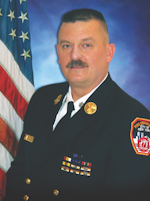The fire service has a great reputation of brotherhood and of firefighters, officers and chiefs getting along. Both volunteer and career personnel will tell you that great relationships, working conditions and friendships have a positive effect on the overall firehouse atmosphere. Could this positive atmosphere create a negative situation?
Potential for trouble
Lt. Bessman is on duty in L-99. He is in the company office preparing his notes for a company training session that he plans to hold with the on-duty members later in the afternoon. There is a knock on the door, and Firefighter Wasco enters and approaches the officer. He asks the lieutenant whether the company could drive by the local auto parts store while it’s out. His wife just called to inform him that the store called and said the parts that he ordered last week were ready to be picked up.
So far, this all sounds pretty routine.
Bessman asks the firefighter where the auto parts store is located. Wasco tells him that the store is just a few blocks outside of the company’s response area.
This information suddenly changes this routine request into something that requires a much more complex decision. What do you believe that Bessman should say? Is this a “yes,” or is it a “no”?
What are the positives and negatives that are involved in this situation? If the officer says “yes” to this request and the unit leaves its response area, could this cause a delay in the company responding to an alarm at the far end of the district? Could the company be involved in an apparatus accident outside of its area? Could this single decision to allow the company to travel slightly out of its response area set a precedent for future requests by other members? Could a battalion chief who is returning from an alarm observe the unit outside of its area at the auto parts store?
Could a “yes” to any of these questions have a negative effect on Bessman’s career and reputation? No need for you to respond. I’ll give you that answer: Yes!
What are the positive results to saying “yes”? The firefighter will be happy that he won’t have to pick up the parts while off duty. He will have the parts when he gets home in the morning and can repair his vehicle sooner. The auto parts store might give him a discount to promote more firefighters to shop there in the future. His wife won’t have to rent a vehicle to go to work.
Did you notice that all of the benefits are to the firefighter and all of the risks are to the officer? Please keep this in perspective and know that this isn’t an officer vs. firefighter situation. However, you also should look closely at the risk vs. result and note that the officer’s career could be affected negatively and that the worst result for the firefighter is that he might need to rent an automobile for a day or two.
What’s the ask?
What other types of situations can create similar difficult decisions? Could a firefighter ask an officer for permission to take a quick run down the block to make a bank deposit? Could the firefighter ask the officer to drive by the bank if the company gets a run? Could a member ask the officer whether the company may stop by the ball field that’s two blocks away from the firehouse with the apparatus so one of the on-duty members can play for a few minutes until a late-arriving off-duty company member gets to the ballgame?
The situations that are discussed above might never happen at your firehouse, but it is guaranteed that a firefighter will ask an officer for something similar. If you are an officer, you always should think clearly and consider the effect that such a decision might have on your career if things don’t go as expected. Ask questions before making any decision. Will you be breaking or bending department regulations? Is there any other way by which the request can be accomplished without a negative effect on the unit’s capability to provide service or on your career?
Saying “no” can be a very difficult assignment. Think about that.
John J. Salka, Jr., will present “Fireground Responsibility” and “RIT Gone Wrong” at Firehouse Expo. To register, visit firehouseexpo.com.

John J. Salka Jr. | Battalion Chief
JOHN J. SALKA JR., who is a Firehouse contributing editor, retired as a battalion chief with FDNY, serving as commander of the 18th battalion in the Bronx. Salka has instructed at several FDNY training programs, including the department’s Probationary Firefighters School, Captains Management Program and Battalion Chiefs Command Course. He conducts training programs at national and local conferences and has been recognized for his firefighter survival course, “Get Out Alive.” Salka co-authored the FDNY Engine Company Operations manual and wrote the book "First In, Last Out–Leadership Lessons From the New York Fire Department." He also operates Fire Command Training, which is a New York-based fire service training and consulting firm.






